I currently share my life with two Siberian Huskies – puppy Lara (7 months old) and Shania (3.5 years old). Both of them are very silly, and very energetic. They love to play, explore, and hunt for earth critters.
Siberian Huskies are beautiful dogs who love people and love life. They can be great family dogs if properly trained. However, because of their high energy and high prey drive, they require a lot of daily exercise and are not to be trusted off leash. When bored, a Husky may chew, dig, and escape to look for adventure elsewhere.
Before getting a Sibe puppy, find out all you can about the wonderful nature of Siberian Huskies – the good, the bad, and the quirky.
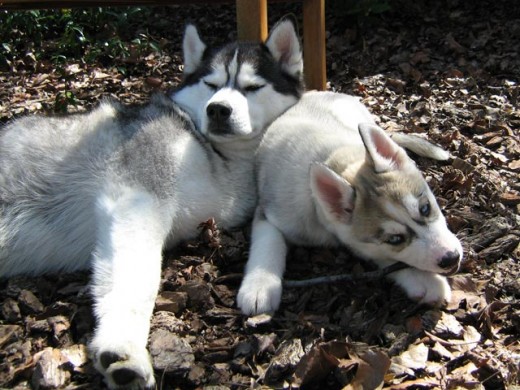
Siberian Huskies – The Good
1. Siberian Huskies are love bugs.
Sibes are very affectionate dogs. They are especially friendly with people, even strangers.
Husky Shania has very many friends in our neighborhood and she enjoys going to say hello to them every day. Her most favorite friend in the world is the Awesome Cookie Guy. Whenever we pass his house, Shania always stops and waits. When her Cookie friend spots her and comes out, he comes bearing gifts – a yummy low-fat cookie for Shania!
Shania also comes to me when I am sad or upset. She will lie down next to me or lay her head on my lap and give me licks.
The people trusting nature of Siberian Huskies make it easy to find caretakers for them when I get busy, or when I need to leave on emergencies or vacations.
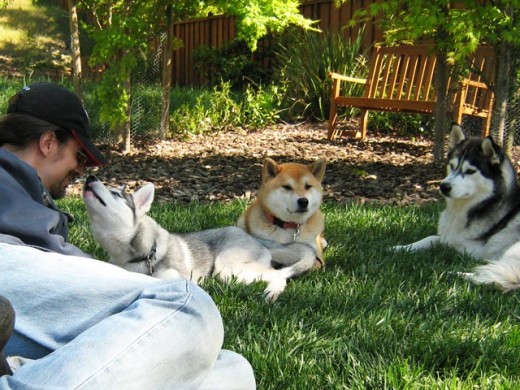
2. Siberian Huskies are athletic and have a strong zest for life.


Lara and Shania are frequently on the go. They enjoy re-landscaping our backyard, attacking bushes, pulling down trees, running, jumping, and digging. They both enjoy playing chasing games and are always ready to go out for a walk and explore. They get very excited whenever anybody comes to visit and enjoy spending play-time and rest-time with their pack.
As part of their zesty life program, Huskies also love to eat.
Both Lara and Shania will eat and eat and continue to eat more if they can. To keep them healthy and slim, I set up a fixed eating schedule and only give them their allotted amount of food. If I give them treats, then I reduce their regular meals a bit so that they keep a fairly constant caloric intake.
Sibes are not shy about stealing food or begging for food. Both Lara and Shania will steal each other’s food if they can. They will also steal from my other dog, Shiba Inu Sephy.
I always supervise them closely during meal-times. Food stealing can encourage food aggression, so I train my dogs not to steal and teach them that if there is any stealing, I will handle the situation.
Siberian Huskies can also get impatient about food and may get slightly overzealous when taking food out of your hand. Bite inhibition training is a must.
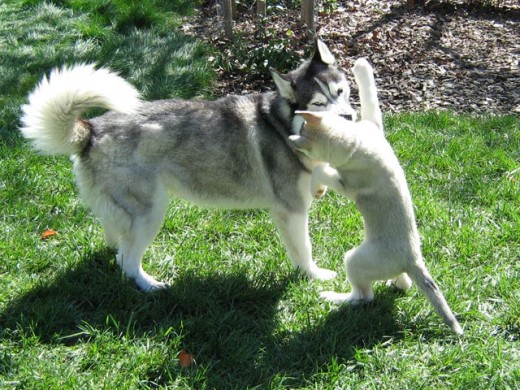
3. Siberian Huskies are clever and independent.
Reward Training
Sibes are smart and will quickly learn new commands and figure out interactive toy puzzles; especially when food is on the line.
Lara learned how to Sit on command as soon as we got her home (8 weeks old). In fact, if we use positive reinforcement techniques, we can start obedience training puppies as early as 6 weeks old. However, puppies should not be removed from the litter until they are at least 8 weeks old.
With clever and independent dogs like the Siberian Husky, it is most effective to use reward training techniques. I teach my Huskies that the best way to get what they want is to do what I want first. Here is more on how I trained my Husky puppy.
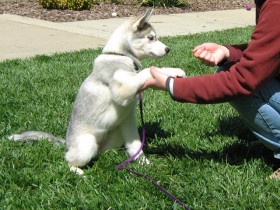
- If they want to go play in the backyard, they must first do a simple Sit next to the door.
- If they want their food toy, they must first do a Handshake.
- If they dig where they are not supposed to in the backyard then they lose their backyard privileges.
Since we control all of our dog’s resources, we can encourage good behaviors and discourage bad behaviors by tying those behaviors to our dog’s most desired resources.
With reward training my Sibes are always motivated to work. They are never hand-shy and love being with people. Siberian Huskies have a wonderful independent spirit, so we should not shock them, choke them, or physically dominate them into submission.

Siberian Huskies – The Bad
1. Siberian Huskies shed a whole lot.

Sibes blow their coat once or twice a year. During this time they will shed most of their undercoat and replace it with new fur. Frequent brushing will help to control some of this shedding and keep our Husky comfortable and clean.
Even though they may only blow their coat twice a year, Sibes actually shed all year round. There is Sibe fur everywhere in our house, including carpets, tile floor, counters, tables, chairs, blankets, and beds. Hair can also get onto kitchen utensils, food, and drinks.
Another issue to consider is pet allergies. Many people are allergic to dog or cat hair. Although Siberian Huskies have little doggy smell and are not one of the most allergy-causing breeds, a serious pet dander allergy of a family member should have you reconsidering a dog for your choice of pet.
~~[Siberian Husky Club of Canada]
Because they shed so much, try to make brushing and handling fun for your Husky. I always pair brushing sessions with food so that it becomes a fun and rewarding experience. I start with a soft brush and slowly switch over to using the Furminator which is awesome at getting out a dog’s undercoat.
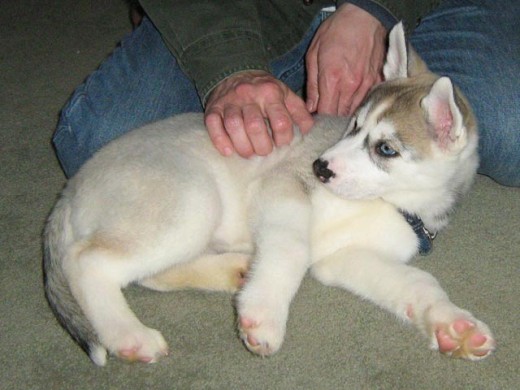
2. Siberian Huskies are awful guard dogs.

Sibes look wild, like wolves. For this reason, many people think that they make fierce guard dogs.
In truth, however, a Husky is more likely to invite strangers into your home with open paws and give them many licks.
Siberian Huskies are happy, goofy, and naturally trust all the people that they see.
My Siberians may sometimes make a fuss when people are at the door, but it is out of excitement rather than a warning cry.
Also, my Siberians will happily follow anyone home as long as they have some yummy pieces of food.
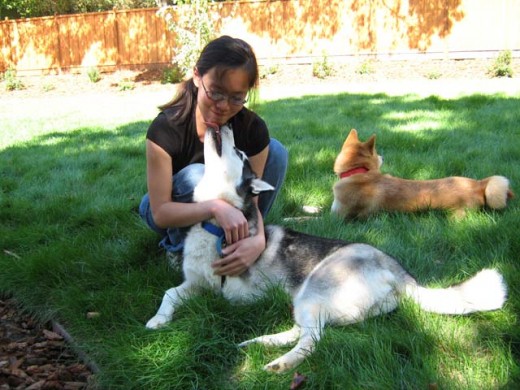
3. Siberian Huskies have very high prey drive.
Husky Shania is a very accomplished huntress.
When we first got our backyard landscaped, we had a big Earth Critter Attack. There are a fair number of rodents including gophers, voles, and mice that live in our area and they decided to throw a big party on our newly planted grass. Holes were appearing everywhere and the organic scent-based pest control we used did not seem to have much of an effect.
We were worried that our yard would not even last the year but then huntress Shania went into action. After a few days of hunting and marking, we noticed that the Rodent Gang had moved their party location somewhere else!
However, this high prey drive also makes it extremely risky to let a Sibe go off-leash in a non-enclosed space. If she spots a deer or squirrel, she will be gone and away before you can shout Stop. Siberian Huskies are very athletic and can cover large distances in a fairly short amount of time.
High prey drive also means that a Husky will have a strong instinct to chase and hunt cats and possibly also small dogs.

4. Siberian Huskies love to pull, pull, pull.


Sibes were bred to pull sleds, and today, they still love to PULL!
One of the biggest challenge with my Huskies is teaching them how to walk without pulling and/or to only pull on command.
The easiest way to leash train a Husky, is to start when she is young and still small. I have tried a variety of techniques with my dogs and what has worked best are the red-light,green-light technique and the 180-turn-around technique.
I started leash training puppy Lara almost as soon as we got her. First I trained her in our backyard. After she was fully vaccinated, I started leash training her around our neighborhood.
While leash training a Sibe, it is very important to be totally consistent. I stop as soon as puppy Lara starts to pull and if she pulls too much, I turn around and walk in the opposite direction. This teaches her that the fastest way to get to where she wants to go is to walk along with me at a measured pace.

5. Siberian Huskies love to sing.
Sibes have a great singing voice. However, neighbors may not particularly enjoy it when Siberians decide to sing or howl to the moon.
Husky Lara is a very vocal dog. She barks when excited, frustrated, scared, and sometimes when other dogs are barking. I have to spend more time and effort training her to stay quiet because her natural instinct is to vocalize.
Husky Shania is a more quiet dog. She almost never barks and the only time she vocalizes is when she is playing with my other dogs. She also sings beautifully when she hears a squeaky toy.
My Husky breeder tells me that there are some Sibe bloodlines that are more noisy than others. Lara’s mother, for example, comes from a more vocal bloodline.
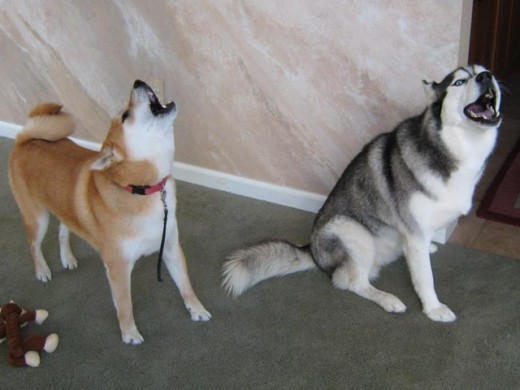
6. Siberian Huskies are a big time commitment.

Sibes are very energetic and affectionate. They like being with people and they also need something to do. Otherwise, they will get bored and get into at least 10 kinds of trouble.
All my dogs work for all of their food, either through obedience exercises, grooming sessions, play sessions, or through interactive food toys. In addition, they go for 1.5 hour daily walks and wrestle with each other several times a day. Sometimes, I join in on the fun and play flirt pole or the water hose game with them.
When bored or lonely, a Husky will figure out her own activities, which may lead to property damage or escape expeditions.
Do not get a dog, especially a Siberian Husky, unless you have a lot of free time to spend with her. If you must work long hours, consider dog daycare or hiring a dog walker. Sibes do best when there are many interesting activities throughout the day and frequent human supervision.

I Love Siberian Huskies
Sibes are awesome dogs. They are always ready of adventure, and they will be there to give you licks and support when you need it, or even when you don’t.
I got my Huskies through the breeder list from the Siberian Husky Club of America. I also considered adopting from my local Siberian Husky rescue, but did not find one that fit well with my Shiba Inu.
It is best to avoid backyard breeders, pet stores, and online pet stores. Such establishments almost always sell unhealthy puppies with poor temperaments.
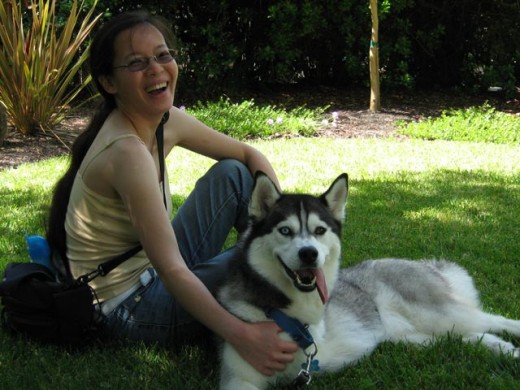
Source: Siberian Husky Pictures.
Hello Fareena,
When I crate train my dogs, I try to make it into a very positive and rewarding experience. I want them to see the crate as a safe place where they can go to rest or eat.
http://shibashake.com/dog/how-to-calm-a-fearful-reactive-dog#crate
I also let my dogs work on a frozen Kong while they are in their crates at night.
Here are some of other things that helped with my Sibe puppy-
http://shibashake.com/dog/puppy-obedience-training
http://shibashake.com/dog/how-i-trained-my-husky-puppy
I have husky biting always how could I stop it
My husky about 9 months every time I crate him at night now he bites us… What should I do
I recently had to say goodbye to my Siberian companion after 14 years of being best friends. I agree with most of the attributes listed here but wanted to add my experience for anyone that is interested. I got my Husky from a local kennel. They had a wolf kenneled on site seperately. After bringing him home he did not want to interact with anyone but me, even when socializing him. He was amazing with other animals, he thought they all wanted to be his buddy. After a few years he was still shy of strangers and it took him a while to warm up to new friends. He was very protective and only accepting of children within our family. We noticed that he would pace the house to check any noises he heard while we were sleeping. He started getting doggie dementia around 12 years and instead of his tail being curled and perky, it would go straight down, even while out on walks. Working with my vet to keep him happy and to make sure I was doing what was best for him, I was informed that he was like the happy old man that had no idea was going on but still had periods of being alert. I had researched endlessly before getting him and discussed some of the things I noticed with my vet. That’s when we realized that somewhere in his ‘papered’ bloodline there probably was wolf in there based on what I shared about his manorisms and temperament. I trained him and spent a lot of time with him which is probably what made him the great dog he was. Nonetheless I don’t believe he displayed the typical traits of a Siberian and want to share my experience so you may be a little more informed on the variance that is possible. Breeder, socialization, nurturing, training and love all play a part in a successful partnership. Depending on the quality of the breeder (which ours was shut down to find out later), you may not always get what you are intending. I wouldn’t change my situation in any way as my Siberian was my best friend, my companion and a family member. It has taken me almost a year to get over loosing him and I still miss him deeply everyday. It was the greatest bond I have ever had in my life and it has been harder for me than any loss I have experienced. I would recommend Siberians to anyone wanting a great challenge and a richer experience in loving life. An active lifestyle is required or they can get bored and destructive when trying to prove a point. It takes great dedication, but comes with a significant reward to be a great pack leader of a Siberian. 14 years wasn’t long enough for a love like that! Good luck, and I hope you find whatever you are looking for in a companion. I found an unparalleled love I will never forget.
Hello Shauna,
Congratulations on your new Sibe puppy! She sounds like a very smart and active girl.
“how am i meant to house train her?”
With my Sibes, I make sure to reward them very well with food, affection, and games when they potty outside. When they potty inside, I no-mark them (Ack-Ack) to let them know that this is not a desirable behavior. Then I interrupt their potty, and take them outside.
It they continue outside, then they get praised and rewarded. This teaches them that –
Going Outside = Food, Attention, Games
Going Inside = Get interrupted and taken outside.
Consistency is key. Once I was consistent about supervising them, and bringing them outside, they quickly learned to do the right thing.
Here is more on my potty training experiences-
http://shibashake.com/dog/puppy-potty-training-fac
In terms of breeding, it is not something I have much experience in. I will ask my Sibe breeder and see what she says.
Hello Tracy,
Thanks for sharing your Husky’s story with us. He sounds like a very happy and lucky boy!
“Huskies like all dogs are a big commitment but they are fantastic pets if you are prepared to put in the positive reinforcement training they need.”
Very well said! Couldn’t agree more.
Hello,I have recently got my loving husky pup (Diesel) I live on a farm and have another collie dog called (Roxy) roxy is a house dog and because of Dies’s high prey she isnt allowed to stay inside either. However Diesel stays around the farm which includes, Sheep, lamas, cows,horses and chickens..The only thing i have ever seen her kill is piegons. She enjoys digging and mostly going on adventures in the car/lorry/tractor/digger..anywhere you go she wants to. Diesel is currently off the leach during the day and is free to run around an open area. She is 20weeks old. The only problem i have with her is, i cant get her to do things on command apart from coming over when called. She wont sit (even for food) instead she will jump about. She has sort of trained her self outside like she only uses the toliet outside, in the near further i want to bring her into the household (im building my own house as we speek) so how am i meant to house train her? I also want to bred her as she has gogerous markings but I not sure that even if i wait for a couple of years (until she 3years old) that she will still be a good mother. how do i help encourage this?
Loved reading all the comments. I have a two year old husky whom I’ve had since three months old. I have taken him to dog training classes from the time I bought him and he is in the advanced class now. I let him off lead during walks and he loves to run, mostly he will come back when called but ignores me if he sees another dog! He gets on well with my 8yr old springer and the 12yr old yorkie keeps him in place! He is great with my 3yr old grandchild and has an excellent temperment. He had a very sensitive tummy and after talking to another husky owner we now give him dried food and two raw chicken wings a day. Must say it has worked wonders! He loves to play, digs, chews shoes and loves interactive toys. He is very food orientated. Huskies like all dogs are a big commitment but they are fantastic pets if you are prepared to put in the positive reinforcement training they need.
I adopted a 3 year old female sibe from our local humane society. She doesn’t really fit the breed behaviors. She was aggressive with our chocolate lab. She attacked the lab and ripped her side. She seems afraid of people and growls at children. She also isn’t very vocal. Does anyone have any suggestions on how I can help her feel more secure and how I can help her around children.
My dogs will sometimes try to groom each other. I find though, if I keep them well brushed especially when they blow their undercoat, that they feel less of a need to do it themselves. Swallowing too much fur can also lead to coughing and discomfort.
Over-grooming can sometimes also be a displacement behavior. Exercise, games, making them work for their food, and obedience exercises can help to keep them occupied.
http://shibashake.com/dog/hyperactive-dogs-how-to-calm-a-hyper-dog-or-hyper-puppy
**HELP PLEASE**: We have two 2 year old Siberian Huskies and have found now two winter’s in a row that the more dominant of the two (Max) has pulled off a good portion of the other one (Gemma’s)coat. She now only has ~25% of her outer coat on her back. Neither of them are agressive and Max leaves her coat alone in the summer. He tends to do it when they are alone, we very rarely catch him doing it. We have tried sour apray and even cayenne pepper but it hs not stopped him. We are thinking of getting her a dog jacket to cover her back up but deep down we know they will just chew it up. Has anyone else had this experience or heard of it??? Please leave any thoughts – we live in northern NH and she really needs her coat, now it gets matted with snow and she gets cold.